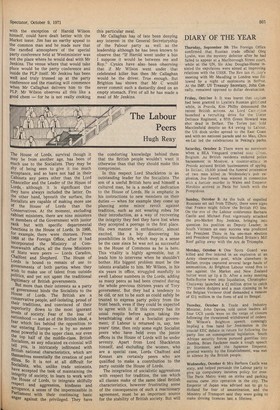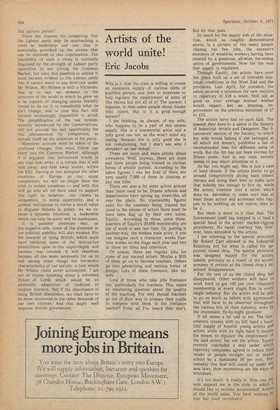fr The Labour
Peers
Hugh Reay
The House of Lords, survival though it may be from another age, has been of much use to the Socialists. They may be shy of being seen to give it too much acceptance, and so have not had in their Cabinets any peers other than the Lord Chancellor and the Leader of the House of Lords, although it is significant that they have always included the latter. On the other hand, bgneath the surface, the Socialists are capable of making more use Of the House of Lords than the Conservatives. At the moment, excluding cabinet ministers, there are nine ministers or members of the Government with junior rank but with specific departmental functions in the House of Lords. In 1966, for example, there were thirteen. From .1968 at the Foreign Office, after it had Incorporated the Ministry of Commonwealth affairs, all the three Ministers Of State were peers — Lords Caradon, Chalfont and Shepherd. The House of Lords is bound to remain of use to governments of both parties when they Wish to make use of talent from outside politics, and yet not upset the traditional legitimacy of British governments. But more than their interests as a party of government binds the Socialists to the House of Lords. The British are a conservative people, self-isolating, proud of their traditions, and convinced of their superiority down to the most ignorant levels of society. Fear of the loss of nationhood — and so of the British ideal, a fear which lies behind the opposition to our entering Europe — is by no means most powerful in the upper class, nor even the top half of the middle-class. British Socialism, as any educated ex-colonial will eli you, is intricately infiltrated with 13ritish national characteristics, which are themselves essentially the creation of past elites. So it is not at all difficult for Socialists, who, unlike trade unionists, have accepted the task of maintaining the integrity of society, to learn to work with the House of Lords, to integrate skilfully respect and aggression, kindness and _arrogance, a sense of the impermissible in Parliament with their continuing basic auger against the privileged. They have
the comforting knowledge behind them that the Britishpeople wouldn't want it otherwise than that they should make this compromise.
In this respect Lord Shackleton is an outstanding leader for the Socialists. The son of a useful British hero and himself a cultured man, he is a model of dedication to the House of Lords. He is emphatic in his instructions to new members on their duties — when for example they come up planning some minor revolt against tradition, such as not wearing robes for their introduction, as a way of recovering the integrity they feel they have lost when they accepted a peerage in the first place. His own manner is enthusiastic, almost excited, like a boy discovering his possibilities in life, which may in a sense be the case since he was not as successful in the House of Commons as he is here. This vitality is highly agreeable, but it leads him to intervene when he shouldn't bother. His biggest problem must be the talents available to him, Mr Wilson, in his six years in office, struggled manfully to swell Labour numbers in the Lords, adding as many peers as had been created during the whole previous thirteen years of Tory government. But they had a tendency to be old, or not to be such as could safely be trusted to express party policy from the front bench, even if they could be expected to agree with it. If this country has its usual respite before again taking the breathtaking risk of a Socialist government; if Labour is returned in, say, ten years' time, then only some eight Socialist peers who have held even the junior offices in the House of Lords will be under seventy. Apart from Lord Shackleton himself, and excluding the women, who are a special case, Lords Chalfont and Kennet are certainly peers who are qualified to make a contribution to the party outside the House of Lords.
The integration of socialistic aggressions with respect for tradition, the use which all classes make of the same ideal British characteristics, however frustrating some of the consequences of such a reactionary agreement, must be an important source for the stability of British society. But will this pattern persist?
There are reasons for suspecting that the Labour party may be approaching a crisis in leadership and one that is essentially provoked by the strains that can be involved in this combination. The possibility of such a crisis is currently disguised by the strength of Labour party opposition to our joining the Common Market, but once this question is settled it must become evident to the Labour party that it cannot move in any direction under Mr Wilson. Mr Wilson is still a Victorian; that is to say, no element in the structure of the world in which he grew up is he capable of changing unless literally forced to do so. It is remarkable what he din't change, and in time this fact will become increasingly impossible to avoid. The simplification of the tax system, recently introduced by the Conservatives, will not provide the last opportunity for this phenomenon, by comparison, to intrude itself on the attention of his party. Moreover, account must be taken of the profound changes that must follow our entry into the Common Market. Although it is arguable that nationhood would in any case fade away, it is certain that it will fade away, and fade away sooner, within the EEC. Having at last accepted the other countries of Europe as our equal competitors, we will no longer have the wish to isolate ourselves — and with this will go also all we have used to support this right to isolation: our claims to uniqueness, to moral superiority, and a general willingness to revive a moral value to disguise failures in policy. As we reenter a dynamic situation, a leadership which can only be static will be inadequate. It is possible therefore that, on the negative side, some of the elements in our political stability will also weaken. For the rewards of being British, which must have inhibited some of the destructive possibilities open to the unprivileged, will become less coveted. It will therefore become all the more necessary for us to end among other things the hierarchic characteristics of our society, a task which Mr Wilson could never accomplish. I am not of course speaking about a reformed House of Lords which would be an admirable adaptation of tradition to modern function. But if the importance of being British diminishes, we shall have to be more interested in the other demands of our own citizens. And that might well improve British government.











































 Previous page
Previous page